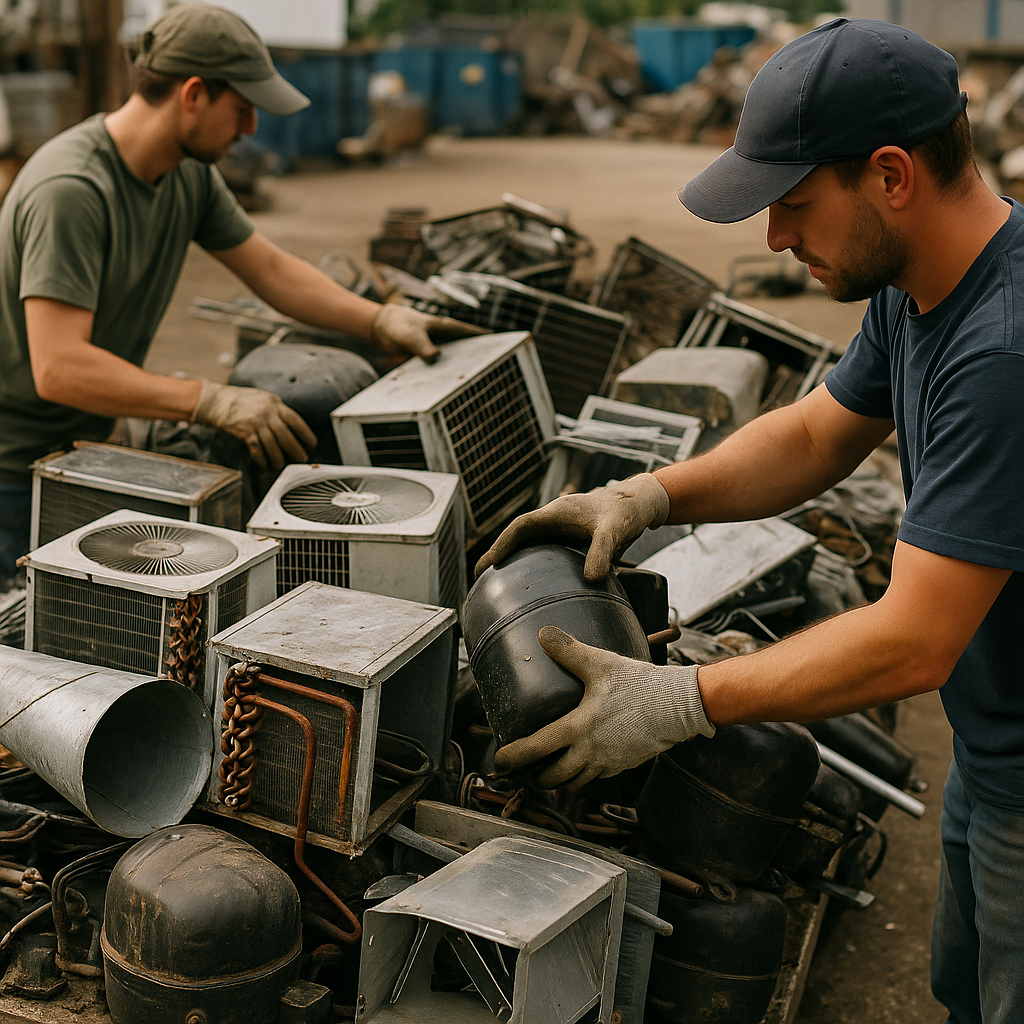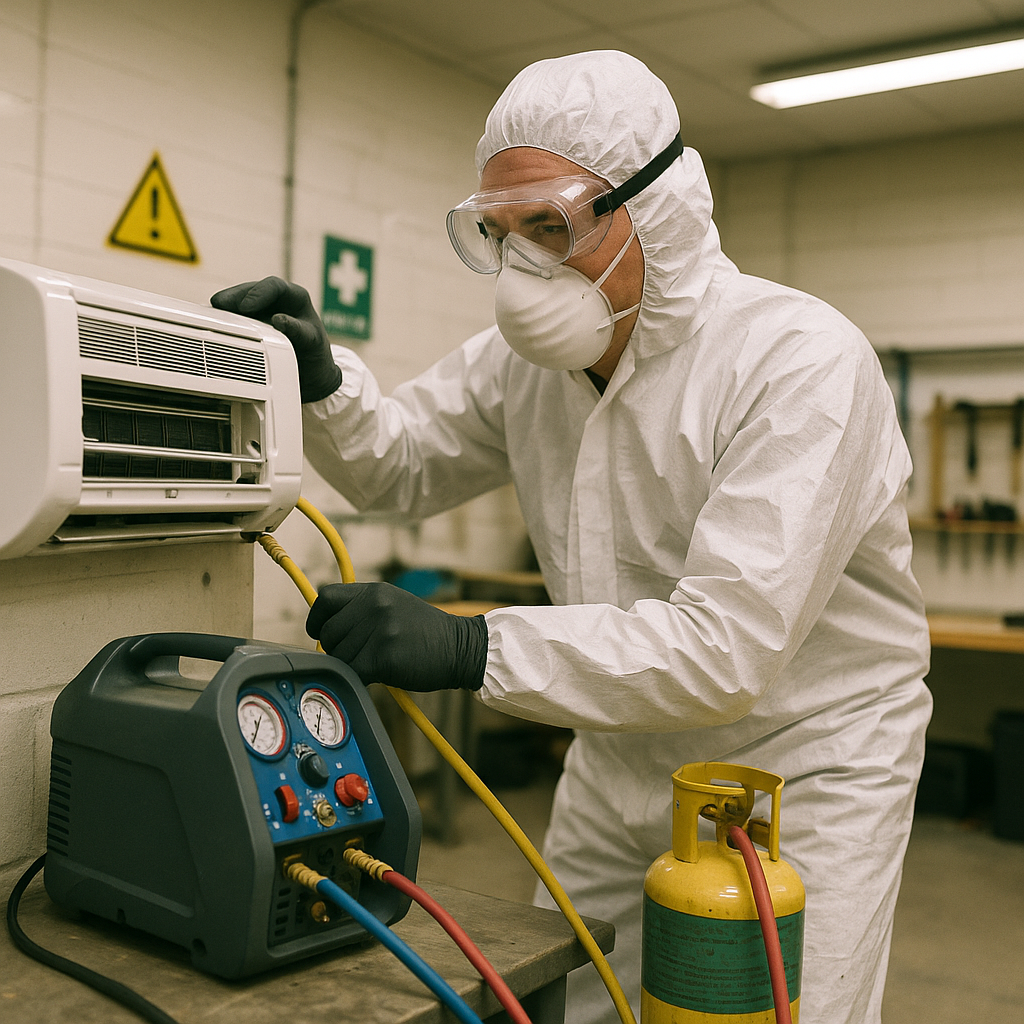5901 Botham Jean Blvd, Dallas, TX 75215
HVAC Scrap Recycling in San Antonio: A Guide to Freon Reclamation & EPA Compliance
November 11, 2025San Antonio generates thousands of end-of-life air conditioning units annually from residential homes, commercial buildings, and industrial facilities. HVAC scrap recycling in the city involves the professional removal, disposal, and recycling of inoperable air conditioning units and related equipment. This specialized service ensures the proper handling of cooling systems that have reached the end of their operational life.
Local companies offer comprehensive services for homeowners, contractors, and large-scale institutions like hospitals and schools. These services include the removal of complete AC units, chillers, heat exchangers, cooling towers, boilers, and rooftop units. Professional HVAC disposal also involves certified Freon recycling to ensure compliance with environmental regulations and proper documentation for refrigerant extraction.
The process extends beyond simple scrap metal collection to include specialized handling of refrigerants, electrical components, and various materials found in commercial recycling operations.
What Types of HVAC Scrap Can Be Recycled?

HVAC systems contain numerous valuable materials recoverable through proper recycling processes. These components range from complete units to individual metal parts, each offering different recycling opportunities and environmental benefits.
Complete HVAC Units and Major Components
We accept and process various types of complete HVAC equipment. AC units are among the most common recyclable items, containing significant amounts of recoverable metals and components. Chillers, especially industrial-grade units, are highly valuable due to their heavy-duty construction and substantial metal content.
Heat exchangers and cooling towers also provide excellent recycling opportunities. These components typically contain copper, aluminum, and steel that can be efficiently separated and processed. Boilers represent another category of recyclable equipment, often containing valuable brass fittings and steel components that remain viable through multiple recycling cycles.
Valuable Metal Components
The most sought-after recyclable materials in HVAC systems include several key metals:
- Copper tubing and wiring – Found in refrigerant lines, electrical connections, and coils
- Aluminum components – Including fins, condensers, and ductwork materials
- Steel structures – Frames, cabinets, and mounting hardware
- Brass fittings – Valves, connections, and specialized components
- Stainless steel parts – Corrosion-resistant components and specialized applications
Copper represents the most valuable recyclable metal in HVAC systems. According to EPA regulations, proper handling of refrigerants must occur before metal recovery can begin. Clean, separated copper typically commands the highest prices in recycling markets.
Motors and Electrical Components
Electric motors from HVAC systems contain valuable copper windings and steel casings. These components require specialized processing to separate the different materials effectively. Compressors are some of the heaviest and most valuable recyclable parts, often weighing between 80 to 120 pounds each and containing significant amounts of copper, aluminum, and steel.
Insulated copper wire from motors and electrical systems provides another recycling stream. The insulation must be removed to achieve maximum value, but the underlying copper remains highly sought after by recycling facilities. Circuit boards from modern HVAC systems can also be processed to recover precious metals and other valuable electronic components.
Understanding which components offer the best recycling value helps maximize both environmental benefits and economic returns from HVAC system disposal. Proper sorting and preparation of these materials ensure efficient processing and optimal resource recovery.
What Recycling Services are Available for Different Clients?
San Antonio recycling services cater to the distinct needs of both residential and commercial sectors. Each client type requires specific equipment, scheduling, and handling approaches to maximize material recovery efficiency.
Residential Recycling Programs
Homeowners can take advantage of convenient curbside collection through single-stream recycling programs. Most residential customers receive weekly pickups using automated collection vehicles that handle 95-gallon carts. These services typically include paper, cardboard, plastic containers, aluminum cans, and glass bottles.
Many providers offer free removal services for inoperable appliances and electronics. Small truck fleets manage these special pickups, ensuring proper disposal of refrigerators, washers, and other large household items containing valuable metals and requiring specialized processing.
Commercial Waste Management Solutions
Business customers need scalable recycling solutions tailored to their waste generation patterns. Commercial facilities in San Antonio handle both office materials and industrial waste streams through advanced sorting technology.
Office buildings typically use 2-yard to 8-yard containers with pickup frequencies ranging from daily to weekly. Retail locations, which generate significant cardboard volumes, require compaction equipment and frequent collection schedules.
Contractor and Job Site Services
Mechanical contractors working on large projects need coordinated pickup and disposal services. Hospital renovations, school construction, and warehouse projects generate substantial material volumes that demand precise scheduling coordination.
Project managers work with recycling providers to ensure on-time pickups that align with construction timelines. Crane-assisted removal is necessary for rooftop equipment and materials from the upper floors of multi-story buildings.
Construction and Demolition Recycling
Roll-off containers are used on construction sites requiring debris removal and materials separation. These containers range from 10-yard to 40-yard capacities, depending on project scope and site accessibility.
Construction debris recycling captures concrete, metal, wood, and drywall for processing into new building materials. Demolition projects require careful sorting to maximize material recovery while meeting environmental compliance standards.
Why is Professional Freon Reclamation Important?

Professional Freon reclamation safeguards both the environment and your organization from significant legal and financial risks. The Environmental Protection Agency mandates that certified technicians manage refrigerant recovery under Section 608 of the Clean Air Act. This regulation is crucial because refrigerants contain chemicals that harm the ozone layer and contribute to climate change when released into the atmosphere.
Certified technicians are trained in the appropriate pump down procedures for various air conditioning equipment types. They employ specialized recovery equipment to extract refrigerants safely from systems before disposal or recycling. These professionals follow stringent protocols to prevent accidental releases that could damage the environment or breach federal regulations.
The certification process ensures technicians can safely handle various refrigerant types. They possess knowledge of pressure characteristics, temperature relationships, and safety considerations specific to each refrigerant. This expertise prevents accidents and guarantees complete refrigerant recovery from HVAC systems.
Environmental compliance necessitates thorough documentation of all refrigerant handling activities. Professional technicians maintain accurate records, including dates, refrigerant types and quantities, system information, and certification numbers. This documentation protects your organization during regulatory inspections and demonstrates adherence to environmental laws.
Improper refrigerant handling may result in EPA fines exceeding $50,000 per day per violation. Organizations attempting Freon removal without certified technicians risk substantial legal and financial repercussions. Professional reclamation services mitigate these risks while ensuring proper environmental stewardship.
Safety considerations make professional handling crucial for protecting workers and facility occupants. Refrigerants can cause severe injuries, including frostbite burns and oxygen displacement in confined spaces. Certified technicians use appropriate personal protective equipment and follow safety protocols to prevent exposure incidents.
Conclusion: Choosing a San Antonio HVAC Recycling Partner
San Antonio’s well-established scrap metal recycling infrastructure offers homeowners and commercial clients reliable options for responsible HVAC disposal. Professional recycling partners provide comprehensive solutions, handling everything from single residential units to large-scale commercial demolitions. These experienced providers ensure proper Freon recovery, maximize scrap metal value, and comply with environmental regulations while delivering timely removal services.
When choosing a recycling partner for your HVAC disposal needs, prioritize companies with proven expertise in managing refrigerants and metals responsibly. For reliable scrap solutions and responsible disposal of your HVAC equipment, contact Okon Recycling at 214-717-4083.
